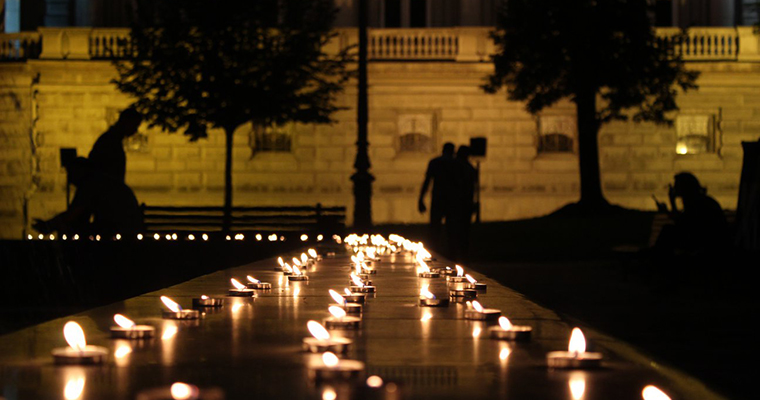Friday at 29 Ustanička Street: Srebrenica Case
The killing of more than one thousand people does not occur in the heat of the moment. And it is not an incident. To kill more than a thousand people, you need intent, an order, men power. You also need decades to pass to achieve a little bit of justice for the families of those killed in Kravica.
The main trial continued on January 31 2020. As early as nine o’clock, a lot of people gathered at 29 Ustanicka Steet: members of the Serbian Radical party, journalists, civil society representatives and, of course, the mothers of Srebrenica who persistently attend every hearing.
How long is this going to last? The Prosecutor’s Office for War Crimes filed charges for the crime in Kravica on January 21 2016. The defence counsel immediately requested a change of the panel and the data on protected witnesses. Further, the trial was interrupted, as well, since the Republican Public Prosecutor Zagorka Dolovac failed to appoint the War Crimes Prosecutor from January 1 2016 until May 31 2017. The Humanitarian Law Centre sees such failure as an obstruction of trial for war crimes.
This time, the young man wearing a badge “There was no genocide in Srebrenica” was absent from the trial, but those wearing red berets and those saluting Aleksa Goljanin, one of the defendants, with three fingers were there. The presence of the Serbian Radical Party supporters, and often of Vojislav Šešelj himself, distracts attention from the victims and transforms the trial into their private circus. Instead of support, victims’ families are faced with obstacles in the courtroom. Besides Goljanin, known for his arrogance and for raising three fingers when his name is called, fully aware that the mothers of Srebrenica are sitting behind him, other defendants are Nedeljko Milidragović, Milivoje Batinica, Aleksandar Dačević, Boro Miletić, Jovan Petrović, Dragomir Parović, and Vidoslav Vasić. The eight defendants were members of the Jahorina Training Centre of the Interior Ministry’s Special Police Brigade. They are charged with committing a war crime against civilians as accomplices. All of them are at liberty pending trial and all of them pleaded not guilty.
Krstina Nikolić and Dobrila Jovanović, defence witnesses, testified at today’s hearing. Witnesses Mevludin Orić, Tomislav Krstović and Neđo Ikonić failed to appear.
Kristina Nikolić was born in the late 1940s. She is from Bratunac. She does not know any of the defendants. Until July 9 or 10 1995, she was performing mandatory labour (civil conscription) at the farmers’ co-op – she was milking cows. She testified about Muslim non-armed civilians who had been coming from nearby forests asking about the command building. Both then and today, the witness knew nothing about the command and she was unable to differentiate between military and police uniforms. She says that she once saw a truck in the yard of the warehouse. With regard to this statement, Mirjana Ilić, the presiding judge, added that this was a truck carrying bodies, which caused confusion in the audience as well, because the witness had previously said that she saw no bodies or them being loaded. The misunderstanding was immediately resolved, when the witness repeated her initial statement. She did not see the civilians being brought to the warehouse nor did she know that they were kept locked there.
The second witness, Dobrila Jovanović, is a distant relative of the first accused Nedeljko Milidragović. In 1992 she came from Niš to Zvornik, where she opened a shop in 1993, together with Milidragović’s wife. She testified that in the afternoon of July 12 1995, she saw Milidragović in Zvornik. He arrived in an UNPROFOR vehicle with several other men, which frightened her at first, until she recognized him. The witness said that later he went towards Bijeljina.
At the end of today’s hearing, the defence proposed that recently opened documents of the UK Ministry of Defence be included in the case file. These are the documents discussed in public at the beginning of January. The Deputy War Crimes Prosecutor Bruno Vekarić said that in his opinion such a thing is not necessary.
In the days when the National Assembly of Serbia pays more attention to the underwear of one of the female Ministers than to the laws – and this is the Minister who, responding to the attacks of the very same Radicals who carefully observe war crime trials, dares not say what court seeks Vjerica Radeta and why – the trial for the war crime in Kravica of July 1995 remains in the focus of one small “group of conspirators”: victims’ families and NGO traitors. In order to change such practice, the Youth Initiative for Human Rights will in future organise collective visits to war crimes trials in Belgrade for young activists, journalists, researchers, and politicians, as well as talks with victims’ families.
The next hearing is scheduled for Friday, March 27 at 9.30 AM.
Andjela Savić, YIHR















